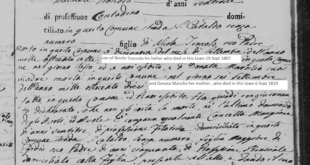The Italian verb mancare has many meanings: to miss (someone)/to need (something)/to lose/to lack/to be lacking/to omit/to fail and can even be used as a euphemism for to die.
Perhaps the most common way Italians use the verb mancare is to convey the idea of “to miss someone,” which was discussed in detail in a previous blog in this series, ” ‘Missing You’ with Mancare” In the prior blog, the conjugation of mancare and the use of indefinite object pronouns needed to convey the idea of “missing someone” was discussed in detail. With this blog, we will now focus on the many other meanings of mancare and discuss other important grammar points one needs to know to converse using this complicated Italian verb!
When evaluating the broad list of meanings attributed to mancare,
it quickly becomes evident that mancare is a verb
that stretches its primary definition of “to miss”
to fit many different situations.
As already mentioned above, the most common meaning for mancare is “to miss” someone. It stands to reason that the verb that describes “missing” can also be used to describe a need for something that is not available. How to say, “I need…” in Italian was covered in detail in a previous blog in this series, “How to Say, ‘I need’ in Italian”. We revisit this topic again, as mancare is yet another way to mention that one needs something!
The concept of “missing” also leads naturally into the literal meanings of “to omit” or “to lack” and the more figurative meaning of “to be lacking,” as in an ability or personality trait. If one takes “lacking” something to the extreme, this may lead to the use of mancare with the meaning of “to fail.” Figuratively, one can fail by simply “missing” or “losing” an opportunity. And in sports, one can literally “miss” a target.
Additional uses for mancare include how to describe how much of something is left (English equivalent = “be left”) or when someone is away (English equivalent = “be away”).
Finally, mancare can even be used as gentle substitute for the verb morire (to die) by relaying the fact that a loved one has been “lost.” Mancare is also an integral part of the idiomatic expression “venire a mancare,” which can also mean “to die.”
There are other instances when mancare may substitute for more commonly used, concrete verbs. The use of mancare as a substitute for more common Italian verbs will also be discussed in the appropriate section.
Grammar for the Italian Verb
Mancare
A note about the Italian grammar for mancare reprinted from the previous blog:
In the prior blog about mancare, it was mentioned that the sentence structure used for mancare when talking about “missing someone” or “to be missing to” is the same as for the verb piacere. Piacere is, of course, the prototype for irregular Italian verbs that only take an indirect object pronoun. You should also realize that this group of Italian verbs works differently from its English counterparts. Therefore, the English translation will not match the Italian word for word. The idea will remain the same, however.
First, let’s look at the English way of thinking. The subject is the person talking and the direct object is who they miss:
English: [subject: person missing someone + miss conjugated to reflect subject + direct object: person missed]
I + miss + John.
Now, let’s turn this English idea around to make an Italian sentence. To Italians, the person who is being missed is the subject of the sentence. With this logic in mind, the person missing someone must be expressed by a stressed object pronoun or an indirect object pronoun. The sentence with a stressed object pronoun:
Italian: [subject: person missed + mancare conjugated to reflect subject + stressed object pronoun: person missing someone]
Giovanni + manca + a me.
(John is missing to me.)
Although our Italian example above is grammatically correct, those conversing in Italian most commonly use an indirect object pronoun instead of the stressed pronoun,* and place the indirect object pronoun pronoun before the verb.
Italian: [indirect object pronoun: person missing someone + mancare conjugated to reflect subject + subject: person missed]
Mi + manca + Giovanni.
(To me is missing John).
More about the Italian grammar for mancare:
To make things even more complicated, mancare can be used as both a transitive verb (as above to describe missing someone, as well as to describe needing something) and an intransitive verb.
Transitive verbs “transmit” their action to a direct object (person, place, thing) that “receives” the action and completes the sentence. If the direct object is omitted at the end of the sentence, the sentence will not make sense.
An intransitive verb does not need a direct object to complete the sentence. In other words, the intransitive verb only involves the subject. Although another phrase may follow the verb in a sentence with an intransitive verb, the subject and the verb of the sentence can stand alone and still make sense.
When mancare is used as an intransitive verb, it is not necessary to use the special sentence structure with an indefinite article!
The transitive or intransitive use of mancare will be listed at the beginning of each section that describes the different uses of mancare, so as to avoid confusion when the example sentences are presented.
Keep in mind that…
although the Italian grammar for mancare
is complicated, it is also useful in understanding
the many meanings of mancare!
Conjugation of the Italian Verb
Mancare
Let’s talk about how to conjugate mancare in the present, past, and future tenses before using it in some example sentences. The spelling for the stem of mancare will change in the present and future tenses prior to adding the new ending to preserve the “c” sound of the original verb.
For those focused on conversational Italian,
the effect will be that this irregular verb has a regular pronunciation!
Present tense: Change the stem for the tu and noi forms by adding an “h” after the “c” to preserve the original sound of the infinitive verb. (Remember that the Italian “ci” combination is sounded like the English “ch” in “cheese.” Inserting the silent Italian “h” prevents this sound combination; instead, the Italian “chi” combination sounds like the English “key.”)
| io | manco |
| tu | manchi |
| Lei/lei/lui | manca |
| noi | manchiamo |
| voi | mancate |
| loro | mancano |
Past tense: When used in the passato prossimo to describe a single event, either avere or essere may be used as the helping verb. The meaning will change depending on the helping verb chosen (See section 4 of the blog.) The past participle is mancato.
Mancare has a regular conjugation in the imperfetto past tense (mancavo, mancavi, mancava, mancavamo, mancavate, mancavano).
Future tense: Mancare has an irregular stem for all conjugations, with the addition of an “h” after the “c,” which preserves the “c” sound of the infinitive verb (mancherò, mancherai, mancherà, mancheremo, mancherete, mancheranno). (Remember that the Italian “ce” combination is sounded like the English “ch” in “cheddar.” Inserting the silent Italian “h” prevents this sound combination; instead, the Italian “che” combination sounds like the English “ke” in the word “kennel.”)
How to Use the Italian Verb
Mancare
1. Use mancare to describe the feeling of “missing” someone (see previous blog about mancare) (transitive)
2. Use mancare to describe “needing” something (transitive)
- It stands to reason that the verb that describes “missing someone” can also be used to describe a need for something that is not available. Therefore, mancare can be used to describe something that a person needs.
- When describing what one is “needing” with mancare, the subject in the sentence is the thing that the person needs; just like with piacere, the third person manca is used if one thing is needed; the third person plural mancano is used if more than one thing is needed.
- For the past tense, again, use the third person singular or plural.
- Use mancare to emphasize the one thing that is needed or is “missing” out of many.
- Remember that there are other ways to say you “need something.” To describe the need for something intangible, use “avere bisogno di.” If the need is for something tangible, and in particular a list of things is being made to do a task, use the verb servire. When emphasizing a desire for something, “averne voglia” is often used. For more on these other options, visit the blog in this series, “How to Say, ‘I need’ in Italian.”
Present tense examples below. Watch for use of manca and mancano.
| Mi manca un corso più per laurearmi. |
| I need one more course to graduate. |
| Mi manca solamente un numero per vincere la lotteria! |
| I only need one number to win the lottery! |
| Mi mancano altri due corsi per laurearmi. |
| I need two more courses to graduate. |
| Mi mancano cento euro per comprare una bella collana per mia madre. |
| I need 100 euro to buy a beautiful necklace for my mother. |
Past tense examples below. Since mancare works like piacere in this case, essere is used as the helping verb for the passato prossimo.
Remember to change the endings of mancato to reflect the subject’s (what is needed) gender and number when using essere as the helping verb for the passato prossimo!
If you need a refresher on how and when to use the passato prossimo and imperfetto verb tenses, visit our blogs about the Italian past tense in this series:
“Imperfetto or Passato Prossimo?” or “Italian Past: Avere or Essere?”
| Mi mancava un corso più per laurearmi. |
| I needed one more course to graduate. |
| Mi è mancato solamente un numero per vincere la lotteria ieri! |
| I only needed one number to win the lottery yesterday! |
| Mi mancavano due corsi per laurearmi. |
| I needed two more courses to graduate. |
| Mi sono mancati cento euro per comprare una bella collana per mia madre. |
| I needed 100 euro to buy a beautiful necklace for my mother. |
| Mi mancava un corso più per laurearmi. |
| I needed one more course to graduate. |
| Mi è mancato solamente un numero per vincere la lotteria ieri! |
| I only needed one number to win the lottery yesterday! |
| Mi mancavano due corsi per laurearmi. |
| I needed two more courses to graduate. |
| Mi sono mancati cento euro per comprare una bella collana per mia madre. |
| I needed 100 euro to buy a beautiful necklace for my mother. |
3. Use mancare to describe the “lack of” or “lacking” something (transitive) or mancare + di when describing a person’s character “to be lacking” (intransitive phrasal verb)
- “To lack” something means that something is “missing,” so of course mancare is the verb to use to express this idea! For instance, one may lack an important tool to complete a particular job. In this case, mancare is used with the sentence structure for a transitive verb (with an indefinite article) and the thing that is lacking completes the sentence.
- Another way the verb “lack” can be used is to describe disappointment in another’s character. Perhaps an individual “lacks” a certain personality trait that another finds desirable or that would help complete an important task. In some sense, when we use the verb mancare to refer to another’s character, we are expressing disappointment that they are “falling short of” what was expected. In this case, the Italian preposition di follows mancare and is combined with the definite article to describe the character trait that is missing.
| A Marco manca la chiave inglese per aggiustare la gomma a terra della macchina. |
| Mark lacked a wrench to fix the flat tire on his car. |
| A lui mancano i soldi nonostante dieci anni di lavoro; ma è una brava persona e mia sorella l’ama. |
| He lacks money despite ten years of work; but is a good person and my sister loves him. |
| Lei è molto bella, ma manca dell’intelligenza per capire le molte cose che succedono in questo mondo. |
| She is very beautiful, but lacks the intelligence to understand the many things that happen in this world. |
| Maria manca della forza necessaria per sollevare la scattola pesante. |
| Maria lacked the strength necessary to lift the heavy box. |
4. Use mancare to describe “failing” at something, perhaps by “missing an opportunity” or by “missing a target” in sports (intransitive)
- If one takes “lacking” something to the extreme, this may lead to the use of mancare with the meaning “to fail.”
- Figuratively, one can fail by simply “missing” or “losing” an opportunity. Of course, one can “miss” an opportunity to do something without failing as well!
- In sports, one can literally “miss” a target.
- Fallire means “to fail,” and is usually used to describe the failure of a business. Interestingly, fallire can be used to mean “to miss,” such as when one has “failed to notice something.” Bocciare also means “to fail,” in reference to an exam, or school, and does triple duty with it’s meanings of “to bounce” or “to hit” (hence the name for the game bocce).
- In this case, mancare is used as an intransitive verb and does not use an indefinite article.
| Marco ha mancato l’opportunità per la promozione; non ha chiesto al capo per tempo. |
| Mark lost the opportunity for the promotion; he did not ask in time. |
| Maria ha mancato la festa stasera; aveva troppo lavoro da finire! |
| Maria missed the party last night; she had too much work to finish! |
| Maria manca il bersaglio a solamente venti metri. |
| Maria missed the target at only 20 meters. |
| Ancora una volta, Mark ha mancato la rete! |
| Mark missed the net again! (= he missed the target) |
A short note (as promised earlier) about how the choice of helping verb used with mancare in the passato prossimo changes depending on the meaning of the sentence.
Notice with the last two example sentences, one could simply say, “Maria missed!” or “Mark missed!” without mentioning the target, and the sentence would still make sense. There is an additional phrase that follows the verb in these two example sentences but the additional phrase is not essential. This is the hallmark of an intransitive verb.
Remember, though, that missing a target is different from missing/lacking something in Italian, as described in Section 3. We could make almost the exact same Italian sentence to describe that Mark was missing something/lacking something/forgot to bring something — for example, a net needed for fishing. In this case, the verb mancare is transitive; the verb transfers action to a direct object —the net —which is essential to the meaning of the sentence. Essere is used as a helping verb to express this different meaning. The English is translated to reflect this difference in meaning.
| Ancora una volta, a Mark è mancata la rete! |
| Mark was missing (was lacking/ didn’t bring with him) the net (net as an object, for example the net with which you fish) again. |
5. Use mancare as the English equivalent of “be left” and “be away” (intransitive)
- When describing how much of something “is left,” in Italian, such as money or distance to the next location, use mancare.
- When describing that someone “is away,” in Italian, as in absent from a meeting, or not nearby, use mancare.
- The conjugated form of mancare will start the sentence or phrase.
- When describing “what is left” or how many people “are away” with mancare, conjugate mancare in the third person singular or plural to match the number of things or people referred to.
- In this case, mancare is used as an intransitive verb and does not use an indefinite article.
| Manca un miglio alla piazza. |
| There is one mile left to (get to) the town square. |
| Mancano due miglia alla piazza. |
| There are two miles left to (get to) the town square. |
| Non siamo pronti per ordinare; manca Maria al tavolo. |
| We are not ready to order; Maria is away from the table. |
| Non è possibile cominciare la riunione; mancano Pietro, Laura, e Anna. |
| It is not possible to start the meeting; Peter, Laura, and Ann are away. |
6. Use mancare alone or “venire a mancare” to refer to a death
- Mancare can be used to describe a relative’s death in a gentle, understated way, mentioning that the person has been “lost,” instead of using the more common and straightforward verb morire (to die). Sparire (to disappear/vanish) is also used to refer to a death, similar to the English euphemism “passed away.”
- The expression “venire a mancare” is idiomatic; the two verbs are used together to create a unique meaning. The use of venire in this manner puts the emphasis on the act of leaving and is used to an individual’s death. Lasciare is the more commonly used verb that means “to leave,” such as to leave a position at work or a romantic relationship.
- In these cases, mancare is used as an intransitive verb and does not use an indefinite article. The usual subject + verb sentence structure is used.
| Mio nonno è mancato ieri; aveva ottanta anni. |
| My grandfather was lost (died) yesterday; he was 80 years old. |
| Mio nonno è venuto a mancare ieri. |
| My grandfather died yesterday. |
Remember how to use the Italian verb
mancare with all it’s shades of meaning
and I guarantee
you will use this verb every day!
For “All the Italian you need to enjoy your trip to Italy,” click on the links below to purchase my Conversational Italian for Travelers books – Kathryn Occhipinti


 Fra Noi Embrace Your Inner Italian
Fra Noi Embrace Your Inner Italian






